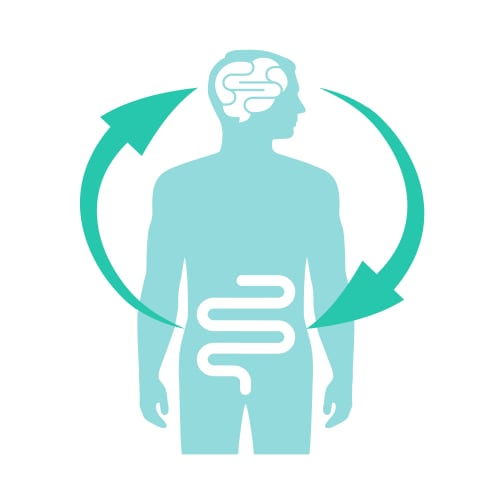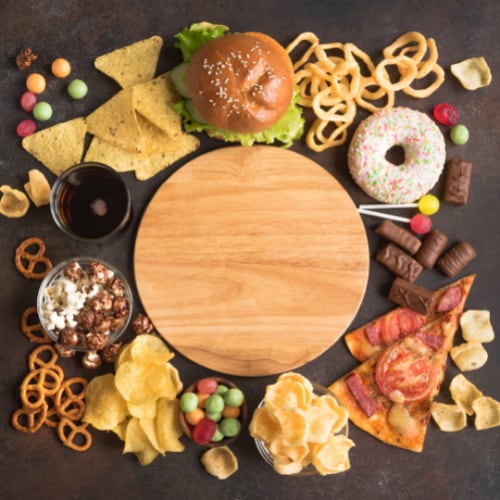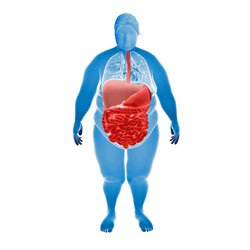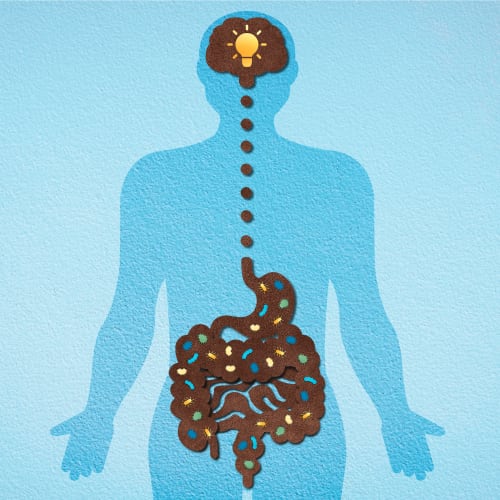 At-Ease: The Role of the Gut-Microbiota-Brain Axis in Wellness
At-Ease: The Role of the Gut-Microbiota-Brain Axis in Wellness
At-Ease: The Role of the Gut-Microbiota-Brain Axis in Wellness

-
Main Ideas
Learning Objective
Understand the Gut-Microbiota-Brain (GMB) axis and how dietary choices impact mental and physical health.
Behavioral Objective
Incorporate anti-inflammatory and gut-friendly foods into your diet to support overall health and well-being.
Key Thought
The health of your gut influences the health of your mind. Nourish both by making mindful dietary choices.
-
Main Ideas
Learning Objective
Understand the Gut-Microbiota-Brain (GMB) axis and how dietary choices impact mental and physical health.
Behavioral Objective
Incorporate anti-inflammatory and gut-friendly foods into your diet to support overall health and well-being.
Key Thought
The health of your gut influences the health of your mind. Nourish both by making mindful dietary choices.
-
Terms
- Anti-Inflammatory Diet
noun
A dietary approach focusing on foods that reduce inflammation in the body, such as fruits, vegetables, healthy fats, and lean proteins. It helps manage chronic conditions and supports overall health.
- Autophagy
noun
The body's process of cleaning out damaged cells and regenerating healthier ones. It is activated by fasting and certain dietary practices, supporting cellular health and longevity.
- Gut-Microbiota-Brain (GMB) Axis
noun
The complex communication network linking the gut, microbiota, and brain. It influences mental and physical health through hormonal, immune, and neural pathways.
- Hormetic Stress
noun
A beneficial form of stress that stimulates adaptive responses in the body, such as improved resilience, enhanced immunity, and increased cellular repair.
- Inflammatory Dysbiosis
noun
An imbalance in the gut microbiota that leads to inflammation and disrupts the normal immune response.
- Intermittent Fasting
noun
An eating pattern that alternates between periods of fasting and eating, which can improve metabolic health, support weight management, and promote cellular repair.
- Ketogenic Diet
noun
A high-fat, low-carbohydrate diet that shifts the body into a state of ketosis, where it burns fat for fuel instead of glucose. It has been shown to support brain health and metabolic regulation.
- Prebiotics
noun
Non-digestible fibers found in foods that promote the growth of beneficial gut bacteria, enhancing gut health and nutrient absorption.
- Probiotics
noun
Live beneficial bacteria found in certain foods and supplements that support a healthy gut microbiome, improving digestion and immune function.
-
Terms
- Anti-Inflammatory Diet
noun
A dietary approach focusing on foods that reduce inflammation in the body, such as fruits, vegetables, healthy fats, and lean proteins. It helps manage chronic conditions and supports overall health.
- Autophagy
noun
The body's process of cleaning out damaged cells and regenerating healthier ones. It is activated by fasting and certain dietary practices, supporting cellular health and longevity.
- Gut-Microbiota-Brain (GMB) Axis
noun
The complex communication network linking the gut, microbiota, and brain. It influences mental and physical health through hormonal, immune, and neural pathways.
- Hormetic Stress
noun
A beneficial form of stress that stimulates adaptive responses in the body, such as improved resilience, enhanced immunity, and increased cellular repair.
- Inflammatory Dysbiosis
noun
An imbalance in the gut microbiota that leads to inflammation and disrupts the normal immune response.
- Intermittent Fasting
noun
An eating pattern that alternates between periods of fasting and eating, which can improve metabolic health, support weight management, and promote cellular repair.
- Ketogenic Diet
noun
A high-fat, low-carbohydrate diet that shifts the body into a state of ketosis, where it burns fat for fuel instead of glucose. It has been shown to support brain health and metabolic regulation.
- Prebiotics
noun
Non-digestible fibers found in foods that promote the growth of beneficial gut bacteria, enhancing gut health and nutrient absorption.
- Probiotics
noun
Live beneficial bacteria found in certain foods and supplements that support a healthy gut microbiome, improving digestion and immune function.
Introduction
The Gut-Microbiota-Brain (GMB) axis is a powerful network that connects the gut, brain, and microbiota. Understanding how this system operates empowers us to take control of our mental and physical health. This topic delves into the influence of dietary choices on the GMB axis and provides strategies for enhancing overall well-being through mindful nutrition.
The Gut-Microbiota-Brain (GMB) Axis
The concept of the gut-microbiota-brain (GMB) axis presents a captivating interplay between the gut, brain, and microbiota, interconnected through the nervous and endocrine systems. This axis plays a pivotal role in maintaining homeostasis, with signals from the gut influencing brain function and overall health. The state of the gut microbiota can significantly impact mood, cognitive function, and immune responses, underscoring the importance of a balanced diet in supporting mental and physical well-being.
Impacts of Diet on the GMB Axis
Our dietary choices profoundly influence the GMB axis. Diets high in processed foods, sugars, and unhealthy fats can disrupt the balance of gut bacteria, leading to increased inflammation and oxidative stress. This, in turn, affects digestion, mental health, and the body's ability to manage stress. Chronic physiological stress from poor nutrition can contribute to conditions like irritable bowel syndrome (IBS), mood disorders, and even metabolic diseases like diabetes and obesity.
On the other hand, dietary interventions such as ketogenic diets, intermittent fasting, and plant-based diets can positively impact the GMB axis. These diets help regulate inflammation, improve metabolic function, and modulate hormone levels associated with hunger and insulin sensitivity. For example, a ketogenic diet has been shown to support brain health by enhancing the production of beneficial ketones, which serve as an alternative fuel source for the brain, reducing oxidative stress and promoting mental clarity.
Choosing Diets Wisely
Many diets promise quick fixes, but it's the sustainable dietary habits that are key to long-term health. It's not about rigidly following a particular diet but about adopting a lifestyle that minimizes inflammatory and oxidative stress. The anti-inflammatory diet focuses on foods rich in antioxidants, healthy fats, and fiber, which support gut health and reduce chronic inflammation. This diet includes colorful fruits and vegetables, whole grains, lean proteins, and healthy fats like omega-3s from fish and flaxseeds. These foods nourish the gut microbiota, enhance immune function, and provide the building blocks for a healthy body and mind.
Food-Related Well-Being
Shifting to a diet promoting hormetic stress-a beneficial stress stimulating adaptive responses-can improve health outcomes. Hormetic stress is a concept where exposure to low or moderate levels of stress can trigger adaptive responses that enhance resilience and health. For instance, intermittent fasting and calorie restriction have been shown to activate autophagy, a cellular process that removes damaged cells and supports regeneration. This approach can normalize lab values, reduce pain and depressive symptoms, and lead to a state where the body functions optimally without the need for medical intervention.
Achieving such a state may seem challenging within the traditional medical model, which often focuses on treating symptoms rather than addressing root causes. However, by aligning dietary choices with the needs of the GMB axis, we can promote a state of well-being that transcends the need for constant medical management. This holistic approach alleviates symptoms and fosters a sense of vitality and resilience.
Creating a Balanced GMB Axis Through Diet
Supporting the GMB axis through diet involves more than just avoiding harmful foods; it's about embracing a lifestyle that includes prebiotic and probiotic-rich foods to nurture beneficial gut bacteria. Fermented foods like yogurt, kefir, sauerkraut, and kimchi, as well as prebiotic fibers found in garlic, onions, and asparagus, can help maintain a healthy gut microbiome. Additionally, mindful eating practices, such as eating slowly and savoring each bite, can enhance digestion and reduce stress on the digestive system.
By understanding and respecting the GMB axis and making thoughtful dietary choices, we can create a state of health that not only alleviates discomfort but also promotes a profound sense of well-being and physiological harmony. This integrative approach to health is a cornerstone of achieving a balanced, vibrant lifestyle.
Gut-Friendly Food Swap
Objective: Identify and replace common foods that may negatively impact gut health with healthier alternatives.
Activity:
- Review your current diet and make a list of foods high in refined sugars, unhealthy fats, and artificial additives.
- Research and identify gut-friendly alternatives, such as replacing sugary snacks with fruits, and processed snacks with nuts and seeds.
- Gradually swap these foods over a week, introducing one or two new healthy alternatives each day.
- Reflect on how these changes affect your digestion, energy levels, and overall well-being.
Mindful Eating Practice
Objective: Develop awareness of eating habits to improve digestion and mental clarity.
Activity:
- Set aside time for each meal without distractions, such as TV or mobile devices.
- Take a few deep breaths before starting to eat to relax your body and mind.
- Chew each bite slowly and thoroughly, paying attention to the taste, texture, and aroma of the food.
- Notice how your body feels during and after eating, and make notes on any changes in digestion or mood throughout the day.
Gut Health Journal
Objective: Track dietary habits and their effects on digestion and mood over time.
Activity:
- Keep a daily journal to record your meals, snacks, and beverages, noting the time and portion sizes.
- Include any digestive symptoms, such as bloating, gas, or discomfort, and rate them on a scale from 1 to 10.
- Document your mood and energy levels throughout the day, especially after meals.
- After two weeks, review your entries to identify patterns between your diet and digestive or emotional well-being.
Course Outline
![]() Session Expired from Inactivity
Session Expired from Inactivity
Do you want to?
9618 Jefferson Highway, Suite D-191
Baton Rouge LA 70809-9636
(888) 424-0032 |
support@supplementrelief.com
* Disclaimer: This page is available exclusively for SupplementRelief.com clients. None of the information on this website is intended to replace your relationship with your healthcare provider(s). Nothing should be considered medical advice. The information, knowledge, and experience shared on this website are the opinions of SupplementRelief.com. This site and its content are intended to enhance your knowledge base as YOU MAKE YOUR OWN HEALTHCARE DECISIONS in partnership with your qualified health professional.
* These statements have not been evaluated by the Food and Drug Administration. These products and services are not intended to diagnose, treat, cure, or prevent disease.
* There is NO GUARANTEE OF SPECIFIC RESULTS for the products or services offered, and the RESULTS CAN VARY for each individual. Any results claimed by our customers are based on individual experiences that are unique and cannot be guaranteed.
FirstFitness Nutrition and NuMedica may be promoted and sold on the internet ONLY by Authorized Resellers who have been approved by and have registered their website domain with these companies. They strictly prohibit, and actively monitor, the UNAUTHORIZED SALE or RESALE of their products in ALL online public shopping portals including Amazon, eBay, and others and into other countries. All products purchased in SupplementRelief.com are for PERSONAL USE ONLY and CANNOT BE RESOLD to others. Please report violations of Reseller Policy directly to FirstFitness Nutrition at 800.621.4348 and to NuMedica at 800.869.8100.
The content and photographs on this website are copyrighted or Licensed Material and may not be downloaded for other than personal use. Republication, retransmission, reproduction, or any other use of the content or photographs is prohibited. ©2010-2024 SupplementRelief.com.
Are you sure you want to remove this item?








